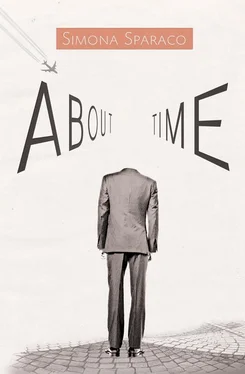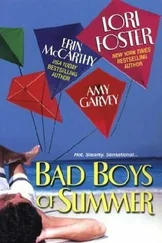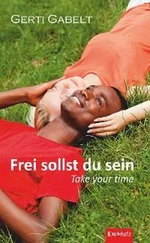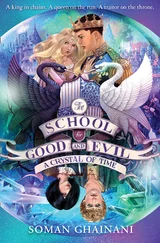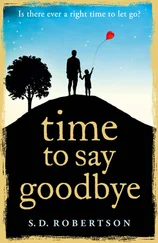She smiles at me. Luminous, transparent eyes, like freshly washed windows, small segments of sky. She says hello to the rest of the table, and with each gesture she makes, each word she utters, I can’t help looking at her. There’s something magnetic about the way she moves and speaks.
I’m in luck, because she sits down just opposite me.
She isn’t a classic beauty, at least not what passes for a classic beauty these days. She looks as if she’s stepped straight out of one of those eighteenth-century French prints: a full, not entirely regular mouth covered with freckles, like the rest of her face, a high, commanding forehead. “Haven’t we met before?” she asks me.
I decide to lie. “I thought so, too, but I can’t remember where.”
“Svevo, right?”
“Yes, Isabelle.”
The laughter and chatter at the table gradually increase in volume, while this unknown woman and I continue looking at each other in silence. Every now and again she turns to listen to what somebody is saying, answer a question or smile at the idiot who’s sitting next to her, this Giorgio she came in with, who can’t stop flattering her, pouring wine and water for her, serving her starters, lighting and relighting the candle when it goes out. He seems so proud of his task as knight errant, but from what I can tell he appears to know he has no hope.
As for me, I haven’t lavished any ridiculous compliments on her, I’m not trying in any way to seduce her. I’m only searching for something interesting to say, and for the first time I’m not in a hurry, I’m not obsessed with the problem of time. I’ve decided to ignore the clock, I want the evening to follow its natural course. However absurd it is, I have the strange, inexplicable feeling that I’m on the verge of something, that something new is about to start. I’ve become a child again and I haven’t yet committed any sins. She doesn’t scare me, she’s like a regenerating force. She could be the one, among so many, who’s ready to join me without any fear of bursting. I imagine the two us, floating, one large bubble.
“I have an image in my head of you with a child in your arms, a little girl.”
“I’m a mother. My daughter’s thirteen months.”
“So it’s true. We have met before.”
“Apparently, yes.”
Luca gives me a sideways glance.
“Are the two of you married?” I ask, indicating Giorgio.
“The two of us? No, we’re just friends. I’m not married.”
Giorgio can’t hide his disappointment. That “we’re just friends” must have made him choke on his bruschetta.
“Maybe we met at work,” I insist, hoping to find out something about her life.
“I’m a photographer, when I’m not a mother, which means not often.”
“A photographer? That’s interesting.”
“I used to do travel stuff,” she says, slipping a breadstick out of the packet, “now I’m in the fashion field.”
“I like photographs. These days, with mobile phones and everything, anybody can take them, our whole lives are filled with them.”
“It’s a pity everything’s digital now,” she replies, biting into her breadstick. “I like to touch photographs, to smell them.”
At this point, Giorgio butts into the conversation. “I agree with you,” he says. But Isabelle doesn’t take her eyes off me.
For the first time in I don’t know how long, I find myself involved in an interesting conversation. We talk about the fact that technology is apparently more democratic: today everyone can aspire to perfection, at least in a photograph. In fashion, she says, retouching is almost obligatory, but she also tells me that when she worked in Paris, for a scientific monthly, it was the most authentic photos that gave her the greatest satisfaction. “In journalism, you almost always look for the truth,” she says. I can see the panoramas she describes to me, the populations of those remote villages where she spent much of her youth, taking photographs.
She must be more than thirty but, I think, not yet forty. She certainly doesn’t have the youthful freshness I usually go crazy over in a woman. And yet I have the impression she knows better than anyone how to wear the time that passes. She doesn’t seem bothered by the small lines around her eyes, and she clearly hasn’t resorted to anything unnatural to try to stretch them. She doesn’t smoke, she doesn’t wear jewellery, her style is minimal, clean and elegant, somewhat old-fashioned. She doesn’t have a touch of make-up on, except maybe a bit of lipgloss, which reflects the quivering light of the candles as she moves her lips. I notice her slender fingers, her short, unpolished nails. I like looking at them as she gesticulates or arranges her hair behind her ears. There can be great sensuality even in an ordinary gesture like that.
I don’t ask her anything about her past, like how she came to be alone in Italy with such a small child, but I do ask her to talk tome about her daughter, whose name is Giulia, she just told me.
“Giulia is…” her eyes light up and she looks in the air, searching for the right words. “Giulia is a force of nature,” she says at last. “She calls me mam ma , with the accent on the second syllable just like in French, and she’s always smiling.”
“Isabelle, do you want to taste a little of my pasta?” Giorgio interrupts us again, this time with a touch of impatience.
“No, thanks,” she replies. “Mine will be here soon.”
Soon , she said. I haven’t been served either. And we’re only on the starters. I thought much more time had passed. I feel extraordinarily relaxed, I can’t believe this is really happening. I almost have the impression that my time is finally slowing down.
You’re going more slowly. I like to imagine You’ve stopped to look at us.
I lift my wrist to my ear and start listening to my watch ticking calmly. For the first time, it gives me an incredible sense of peace.
“Is your watch broken?” Isabelle asks curiously.
“I think so,” I reply, almost euphorically. “I really think so.”
I suggest a toast. Just like that, without any reason, just the two of us, an excuse to smile at her in silence. Actually, what I’d like to do is thank her, I have the feeling this sudden sense of relaxation that’s come over me is all down to her. Isabelle raises her glass, the others look at us in surprise. This cheap red is the best wine I’ve ever tasted and this toast is the most important one of my life. Nobody knows I’m toasting my own recovery, my hope that I’ve got back to normal.
A veil of lightness comes to rest on all things, on the fat, badly dressed women, the tattooed boys, the suggestive looks of the whores, even the strings of sausages over the fireplace. In the meantime I continue talking to her, this woman who knows how to slow down time.
“So,” I say, “Giulia’s always smiling.”
“Always. Every day she learns something new. My God, it seems to me only yesterday I was expecting her, she makes me feel…”
She doesn’t finish the sentence, but I understand perfectly well what she means. She can’t imagine how I live with that feeling every day, and in the most exaggerated, nerve-wracking manner possible.
“Time flies,” she concludes with a shrug. She’s so serene about it, it’s almost infuriating.
“And doesn’t that scare you a bit?”
“No, no more than a lot of other things. I know I’ve used my time as best I could, and now that I have my daughter I don’t want to miss even a moment of her life. Sometimes I imagine her as she’ll be when she’s a woman, and I feel so proud of her, I can hardly wait for that day to arrive.”
I listen to her and I’d like her to take me by the hand, as you do with children when they get restless.
Читать дальше
